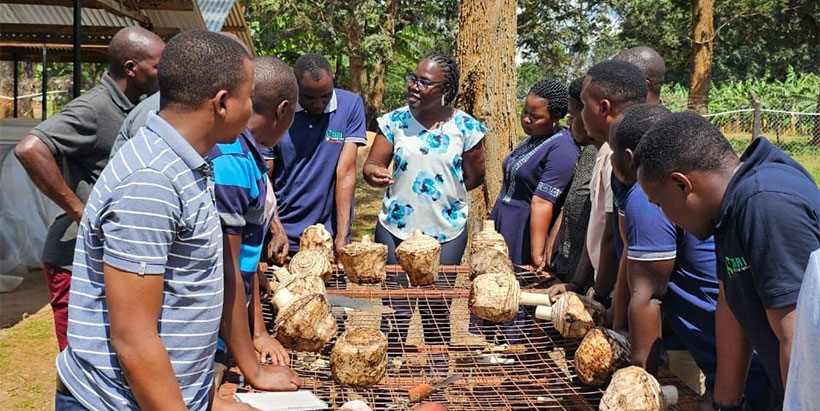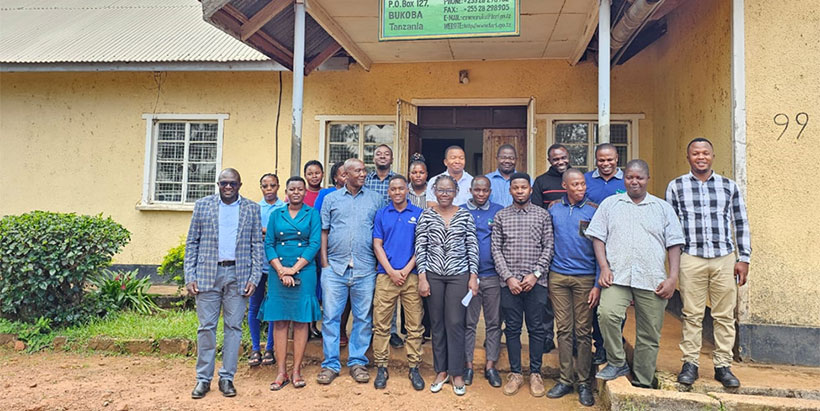Seed systems play an important role in food security and agricultural productivity. However, the subsector faces several challenges, including limited access to quality seeds, seed market monopolization, a lack of seed diversity, and climate change.
As part of efforts to solve the challenges in Tanzania, IITA–CGIAR, through its PROSSIVA (Program for Seed Systems Innovations for Vegetatively Propagated Crops in Africa) project, conducted a training workshop for its local partners, the Tanzania Agricultural Research Institute (TARI) and PlantVillage focusing on using macro-propagation technology to produce healthier, disease-free banana seedlings with improved yields. This initiative aims to enhance food security and boost agricultural productivity.
The training objective was to equip the teams with practical skills in banana macro-propagation and nursery management to improve the production of quality planting materials. The hands-on training aimed to support community-level seed entrepreneurship and address the challenge of insufficient high-quality banana seeds in the country.
Banana macro-propagation is a moderately simple and cost-effective technique to multiply banana plantlets rapidly. It benefits smallholder farmers and areas with limited access to tissue culture labs. This technique is simple and low cost, with the potential for increased seed accessibility, control of diseases, and faster multiplication of seeds compared to the traditional method of field sucker production. Research expert Delphine Amah, from IITA Nigeria, led the training on propagation techniques and procedures, including constructing basic propagation facilities, field selection of parent material, corm preparation, and management for optimal performance.
Moreover, she demonstrated how a single banana corm can produce between 10 to 100 seedlings in just four months, compared to the traditional method, which yields only 5 to 10 seedlings over a longer period.

Dr Mpoki Shimwela, TARI Maruku Center Manager and the National Banana Research Coordinator, believes that learning macro-propagation is one of the crucial measures to fight the Banana Bunchy Top Virus (BBTV) disease and other banana diseases like Banana Xanthomonas Wilt (BXW). “To combat BBTV and other diseases, producing high-quality, disease-free seeds is essential. We previously had limited knowledge and practice of this advanced technology, but this training has broadened our understanding. We now aim to produce more banana seeds using these new techniques and train banana producers in the country,” said Mpoki.
This initiative marks a significant step toward advancing agricultural development in East Africa, where bananas are a crucial food source and income generator for millions, particularly smallholder farmers. The 20 participants in the training came from various TARI centers, including Maruku, Tengeru, Kihinga, Uyole, and other agricultural stakeholders from the private sector Plant Village Tanzania. Training participants formed a WhatsApp platform to share and learn from each other beyond the training with a strong commitment to promoting the technology in their various communities within the country.
PROSSIVA project aims to refine and integrate this technology in seed business models with community-level seed producers, assess the productivity and profitability for sustainable seed production in Tanzania, and ultimately help alleviate poverty for smallholder farmers. By enhancing the partners’ expertise in macro-propagation techniques, the initiative hopes to ensure a more efficient implementation of this technology in their respective roles within the banana seed value chain.
Contributed by Rashid Hadi

